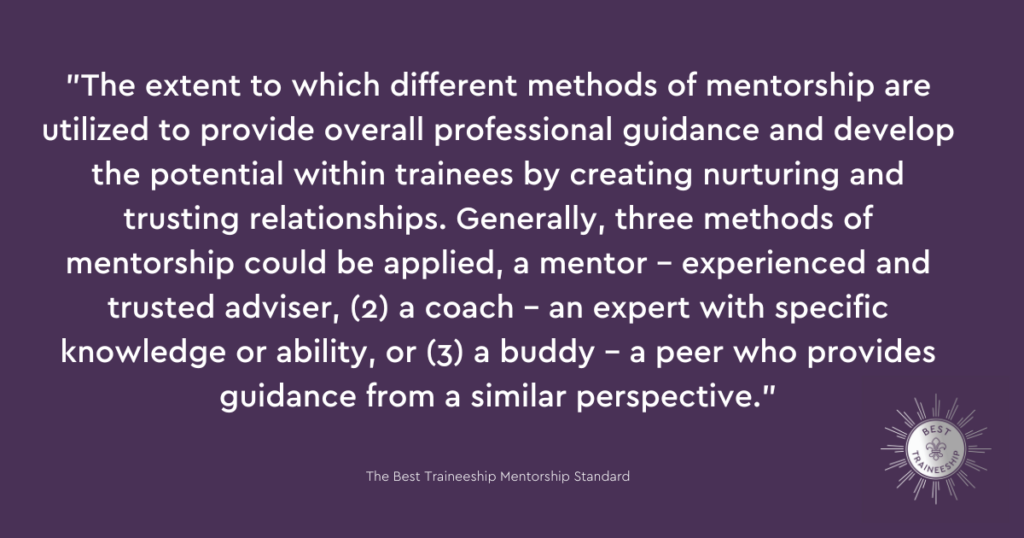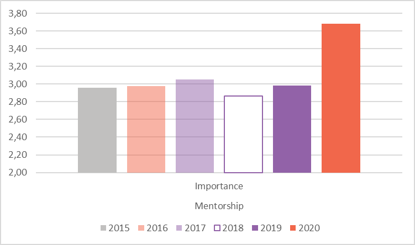Our previous blog covered accelerated learning and how traineeships are a fast-tracked learning experience. Your trainees enter the workforce running, and have to learn a lot in a short period of time – a virtual pressure cooker of experience and expertise, combined with on the job learning experiences.
“A strong mentor can help your trainees develop work-life balance and embrace their role within the company.”
But what is a mentor? And how can they help your trainees develop their skills, and create better, more impactful traineeships?
What Are Mentors?
A mentor is simply an experienced member of your team who guides your trainees in their work, their development, and they provide constructive feedback and support. Often, the challenges lie in that the “experienced” team member has additional, or alternative priorities, and doesn’t recognize the importance of their accountability. This has a huge impact on the trainee’s development and success.
Without being keenly aware of their role, and the importance of prioritizing within the given time constraints the role can feel empty, or with little promise or recognition. There are different types of mentorship, and each has their own benefits. Traditionally we think of the senior mentor – a member of the team who is well established in their position, with vast experience and knowledge. But mentors can also be another trainee, who is a few years into their own traineeship who can share insights. These arrangements can be formal, or informal.A mentor helps strengthen your trainees through personal and professional development. For mentors, it also helps hone their skills and also create opportunities for them to learn and develop critical leadership and personal expertise.

Mentorship Trends
In our last competition, we saw a dramatic increase in how important trainees found mentorship from our trainee survey. Trainees strongly feel the need for effective guidance from mentors, and readied on them for feedback and information

As you can see in the data from 2015-2020, the importance of mentorship grew substantially.
Benefits for Trainees
Trainees rely on mentors for guidance and to learn from people with experience in the field. According to Kieran Canisius, “An excellent mentor creates a structured and regular “safe space” for Trainees to share their short and long term goals and have an active “cheerleader” to navigate the hard to achieve ambitions that a company derives value from.” The vast depth of wisdom and knowledge provided in your workspace means you have a constant living library for your trainees.
The benefits of mentor guidance aren’t just limited to on-the-job training. Mentees can also have direct access to someone who can help them learn the workplace culture. This built-in support can introduce them to the people they will work with and also help them with the day-to-day issues that arise in the workplace. The emotional support and guidance that a good mentor can provide is just as essential as the training aspects a traineeship provides. The opportunity to check in with a mentor is invaluable, as they understand the learning challenges within this working environment.
Of course, for trainees, learning skills from an experienced colleague is of absolute benefit. The support of someone with vast experience and industry insights creates an ideal learning situation – not only through learning new skills, but also reinforcing and reminding of the critical errors that can be made. This can mean less room for error.
Benefits of Being a Mentor
Being a mentor has benefits too. The most obvious is recognizing your team members with valuable experience and insights to share with up-and-coming employees. They gain a sense of recognition as an advisor to the trainee and the satisfaction of giving back is unmeasurable. It gives a crucial sense of importance – their hard work has paid off, and they are trusted to share their insights and experience with the next generation.

There are also benefits, such as refining their leadership skills and learning new skills related to being a mentor, like coaching and active listening. The additional benefit is learning from the trainees – opening them up to newer methods, different ways of thinking, and updated training methods.
Preparing the mentor’s for their role and how you expect them to behave requires thorough preparations for mentors, and outlining the expectations that come with mentoring.
Within the workplace, this also leads to bridging generation gaps. While not always, mentors are the more senior and established members of the company, and trainees are the youngest and “freshest” members. The inter-generational dynamic created here means that both trainees and mentors can learn more about each other, their roles, the expectations placed on them, and the pressures that being a trainee can bring.
Traineeship programs that specifically have guidance programs for mentors create a solid groundwork and ultimately benefit trainees and mentors, and improve the quality of the traineeship.
Mentorship Is Vital
In our research, trainees have reinforced over and over that effective mentorship is critically important to their development in their roles Strong mentorship programs strengthen the entire team – your trainees benefit from the experience of their mentor and have a reliable and available person to guide them through workplace culture and the requirements of their positions.
Mentors also benefit from developing their skills, and feeling that their position and contribution to the company are valued. They share their experience and learnings with up-and-coming team members, and have the opportunity to actively contribute to the training program of the company.
Overall, mentorship is a huge benefit to all, creating opportunities for all to learn, refine skills, and share knowledge.
Best Traineeship Benchmark Report
Mentorship is an essential part of our benchmark standards, and our trainees tell us that it’s important to them. Mentorships encourage intergenerational interactions, create opportunities for experienced staff to share their experiences with new members Our benchmark report shares valuable insights into mentorship, as well as our other benchmark standards – which you can utilize to create or improve your own traineeship program. Order your copy here.


0 Comments